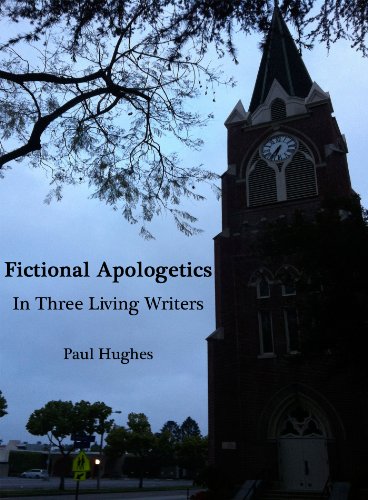Academic and research treatment of the discipline and practice of Fictional Apologetics in three contemporary American writers: Wendell Berry, Ron Hansen, and Tim Gautreaux.
Fictional Apologetics In Three Living Writers


Academic and research treatment of the discipline and practice of Fictional Apologetics in three contemporary American writers: Wendell Berry, Ron Hansen, and Tim Gautreaux.
[Television is educational.] One Saying the same stuff over and over looks like you have different things to say. Two If you’re ever in a below-average film or streaming series, and you beat the tar out of a guy, in a house, and you gaze down in both some shock as also a certain
A line everywhere misattributed to Chesterton reads thus: The young man who rings the bell at the brothel is unconsciously looking for God. This line is not from the great [several senses of the word] man who recently celebrated his 150th birthday, but the mid-century most unmodern novelist Bruce Marshall. The words — which do
Those social media posts of ‘this moment in this famous film was totally unscripted!!!’ as if that by itself makes it better miss the point. Moat unscripted material, like most ideas, inventions, ideas, notions, &c … fails — such is the nature of creativity: the best stuff, it is devoutly to be wished, sticks around;
Imagine someone, potentially anyone, even you, perhaps, but let us, in any case, say. Yes, you. You pull into the diner – Earl’s, Norm’s, Dinah’s, something like that. A sort-of Googie architecture … but maybe not quite, as if it’d been a little late for the Space Age, and late is the one thing you
They say of Jim Brown — When he got to the end zone he acted like he’d been there before. They don’t say this of those who make it there today. There’s something to be said for this, and Vince Lombardi said it — If you aren’t fired with enthusiasm, you will be fired with
Bear no malice nor ill-will to any man living, for either the man is good, or naught: if he be good, and I hate him, then am I naught; if he be naught, either he shall amend, and die good, and go to God; or abide naught, and die naught, and so be lost.
Here’s a way to say it — I pay attention, I notice things, I remember, I make connections; my mind moves fast — and long, on the connections. Draw the well deep, carry far the water. [The semi-colon technically ‘replaces’ the period but artfully between the two a difference wd be how a semi-colon can
Alex Rodriguez cheated. Took the easy way. Lied. And if he really does have faith, as he said after the Red Sox game Sunday, he knows he’s right out of Pinocchio. His lawyer, however, appears to have no idea what a gigantic donkey he himself is. To recap — Ryan Dempster missed Rodriguez with his
These 21 essays, some quite short, cover everything from truth and love, to our humility and happiness, to celebrating meals and cursing God, to baseball and Johnny Cash. Thanks for reading.
Can he play? Should he pray? What’s next for Tim Tebow? … This book asks those questions — and answers them. Thanks for reading.
What’s so wrong with hypocrisy? Other than it being dishonest and demeaning to all that we are as humans … is it really that bad? Actually it can even be good. So, take a look at this book by a hypocrite for hypocrites. Promise you won’t regret it.
Tim Keller has said that our sinfulness is far worse than we ever could imagine, and that God’s love is far more than we ever dared hope. And Christians for millennia have affirmed no better way to learn these truths – and many others besides – than to love God with all our heart and